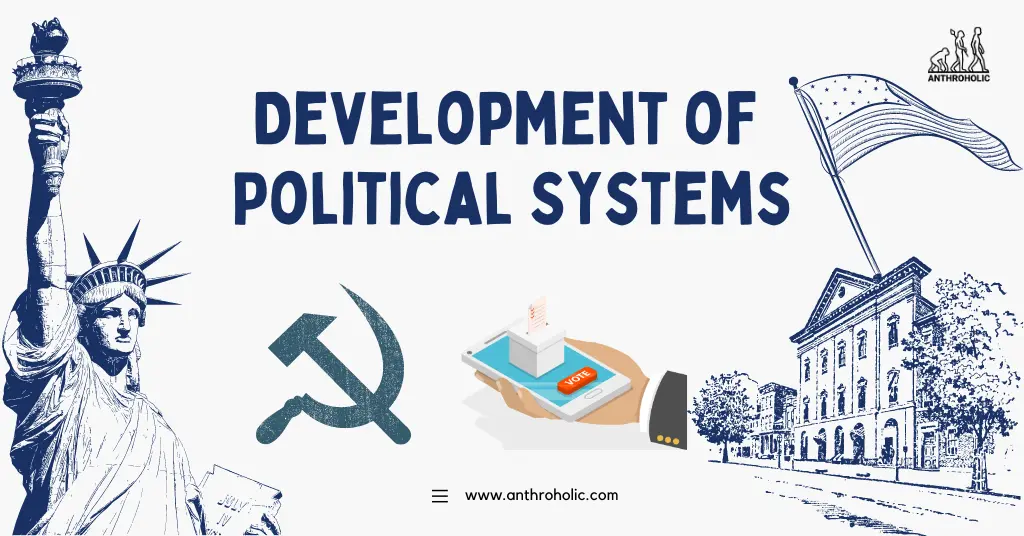AI Answer Evaluation Platform Live Now. Try Free Answer Evaluation Now
Development of Political Systems
Political systems, as mechanisms of governance, have undergone significant changes throughout human history. These systems have evolved in relation to the socio-economic, environmental, and cultural factors prevalent in various societies. This article attempts to chronicle the development of political systems from the prehistoric era to the contemporary era.

Early Human Societies and the Emergence of Political Structures
The Prehistoric Political Systems
Prehistoric human societies were primarily egalitarian, where resources were shared amongst members, and decisions were made collectively [1]. Band societies, which consisted of a few families, lacked formal political organization.
- Band Societies: Leadership was often fluid and based on individual abilities rather than inherited status.
- Tribal Societies: As societies grew and formed tribes, informal political systems evolved with elders or chiefs, often providing leadership.
The Advent of Agriculture and Hierarchical Societies
With the advent of agriculture, societies became settled, leading to increased population density and the creation of surplus resources [2]. This led to the emergence of stratified social structures and complex political organizations.
- Chiefdoms: A single leader (the chief) held power, often legitimized by religious or traditional authority.
- Early States: The population was divided into distinct classes, with a ruler and his bureaucracy exercising control.
The Classical Era: Emergence of Varied Political Systems
Republics and Democracies
The ancient Greeks introduced the concept of democracy, where citizens had a say in governance, a significant shift from autocratic systems [3]. Simultaneously, the Roman Republic emerged, which featured a mix of democratic and oligarchic elements.
Monarchies and Empires
The classical era also saw the rise of monarchies and empires. Monarchs, often seen as divine or chosen by the divine, ruled societies. This system was prevalent across continents, from European kingdoms to Asian empires.
Medieval to Early Modern Period: Transformation and Continuity
Feudalism
In the Middle Ages, feudalism became the dominant political system in Europe. This hierarchical system involved a complex network of loyalties and obligations, often linked with land ownership [4].
Absolutist Monarchies
In the Early Modern period, absolute monarchies became more widespread. Kings or queens had unlimited power, and their authority was often justified by the concept of the divine right of kings.
Modern Political Systems: Democracy, Dictatorship and Beyond
Democracies
In the 18th century, the Age of Enlightenment led to the rise of democratic systems, marked by principles such as liberty, equality, and fraternity [5]. This trend continued into the 20th century, with most Western countries becoming democratic.
Authoritarian and Totalitarian Regimes
The 20th century also saw the emergence of authoritarian and totalitarian regimes, marked by the centralization of power in the hands of a single party or individual.
Post-Cold War Developments
The end of the Cold War led to the spread of democratic ideals worldwide, though the implementation varied considerably. Today, political systems are a complex interplay of democratic, authoritarian, and traditional elements.
| Political System | Characteristics | Example |
|---|---|---|
| Democracy | People have a say in government decisions | USA |
| Absolute Monarchy | Monarch has unlimited power | Saudi Arabia |
| Dictatorship | Power is centralized in the hands of an individual | North Korea |
The Digital Revolution: Impact on Political Systems
Technological Advancements and Democracy
The digital revolution has had a profound impact on political systems. Technological advancements have facilitated greater democratic participation by making information more accessible and enabling online voting. However, it has also raised concerns about privacy and the potential for misuse.
The Rise of E-Governance
E-governance has emerged as an important trend, with governments leveraging digital technologies to deliver services more efficiently and transparently. This transformation has redefined citizen-state interaction, making it more direct and responsive.
The Future of Political Systems: Challenges and Prospects
Political systems will continue to evolve in response to social, economic, and technological changes. Key trends likely to shape future political systems include:
- Sustainability and Climate Governance: With the intensifying climate crisis, the need for sustainable policies and robust climate governance will likely shape future political structures.
- Artificial Intelligence (AI) in Governance: AI and related technologies could transform governance by improving decision-making and service delivery.
- The Balance Between Security and Freedom: Balancing security measures with personal freedoms will remain a critical challenge for political systems in the digital age.
| Future Trends | Potential Impact |
|---|---|
| Sustainability | Shaping policy agendas and political structures |
| AI in Governance | Enhancing efficiency in public administration |
| Security vs Freedom | Shaping laws and policies, particularly in the digital sphere |
Conclusion
Political systems have come a long way from the egalitarian societies of our prehistoric ancestors to the complex structures we see today. As we navigate the digital revolution and confront global challenges such as climate change, these systems will continue to evolve. Studying the development of political systems, therefore, provides valuable insights into our past and a roadmap for the future.
References
[1] Service, E. (1962). Primitive Social Organization: An Evolutionary Perspective.
[2] Diamond, J. (1997). Guns, Germs, and Steel: The Fates of Human Societies.
[3] Herodotus. (440 BC). Histories.
[4] Bloch, M. (1961). Feudal Society.
[5] Tocqueville, A. (1835). Democracy in America.




